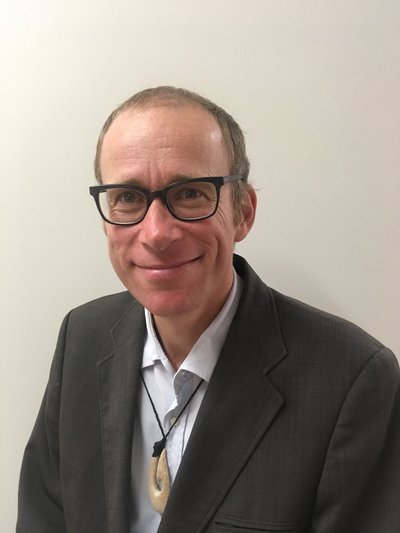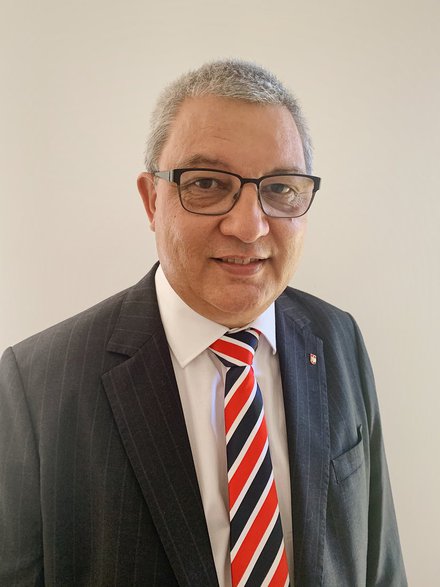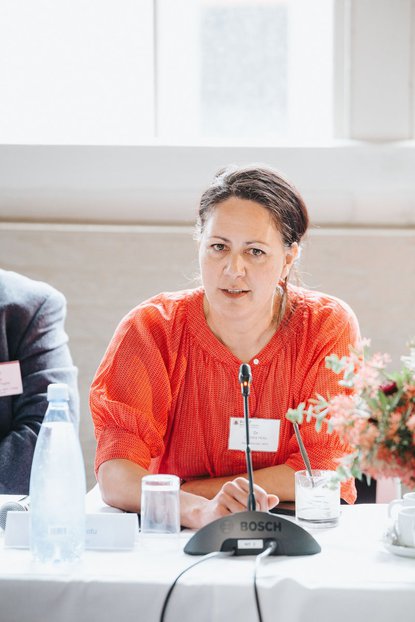

Reflection with RACP Aotearoa New Zealand President
– Dr George Laking
He whitiwhiti whakaaro ma te Perehetini o Aotearoa
– Dr George Laking
Dr George Laking has been the RACP Aotearoa New Zealand President since May 2020. Reflecting on his role, Dr Laking shares “I wouldn’t be here if it wasn’t for my own teachers, Dr Leo Buchanan, Founding Chair of the Māori Health Committee, and Dr Eru Pōmare, Dean of the Wellington School of Medicine. I’m the inhabitant of a long-term leadership role that they amongst others shaped and occupied before me. In the words of Sir James Hēnare, ‘Kua tawhiti kē to haerenga mai, kia kore e haere tonu. He nui rawa o mahi, kia kore e mahi tonu’. ‘You have come too far not to go further, you have done too much not to do more.’”
Indigenous perspective at the centre of the College
Previously Dr Laking was Chair of the Māori Health Committee, one of two Indigenous health committees within the College, the other being the Aboriginal and Torres Strait Islander Health Committee.
“Our College lives in Indigenous lands. In Aotearoa New Zealand, Te Tiriti o Waitangi guarantees a partnership between Crown and Māori in the governance of the country. This means wherever the Crown exerts power, Māori share as equals in the exercise of that power. In virtue of its authority to accredit training and to qualify medical specialists, the RACP is without doubt an agent of the Crown. The College exercises power not only on behalf of the Crown, but also on behalf of Māori. That is one reason why there must be Māori involvement in College governance at all levels of the organisation, starting at the top. Accordingly, in December 2019 at Redfern, New South Wales, Australia, the College Board resolved to establish the Māori Health Committee and Aboriginal and Torres Strait Islander Health Committee, as Committees of the Board. Beyond this constitutional reason to elevate the Indigenous health committees, the imperatives of health equity, cultural safety, and anti-racism offer practical reasons for profile and partnership of Indigenous members within the College,” says Dr Laking.
Work is underway in incorporating the Indigenous perspective in all aspects of the College, including the College’s Constitution. Dr Laking shares “Truly exciting developments are afoot, via the College’s retention of Kāhui Legal in Aotearoa, and Professor Megan Davis in Australia, to reshape the Constitution with regard to Indigenous knowledge and values. That way the RACP will legitimately be able to take its place in a community of service in Indigenous lands. We are ahead of the game here – our expert advisers are writing the book for Indigenous partnership in Trans-Tasman organisations.
“From the Māori side, there are two people in particular we must credit with reaching this point. The first is Dr Tane Taylor FRACP (Hon) FRNZCGP, who has served on the Māori Health Committee and College Council. Tane has been instrumental in many changes in the College, in this case he exhorted us to find the best constitutional lawyers for the task at hand. The next is Rev Dr Hirini Kaa, Historian, and serving member of the Māori Health Committee and the College Ethics Committee. Hirini has been the prophet of Wai 262, the Waitangi Tribunal report that envisages the society that will emerge in Aotearoa New Zealand, once our country gets on track with its commitments under Te Tiriti o Waitangi.”
Improving health equity in Aotearoa New Zealand
In his first Presidential Post in June 2020, Dr Laking reflected on how the Aotearoa New Zealand response to COVID-19 again revealed the health sector’s need to centre equity for Māori and to honour Te Tiriti o Waitangi.
Dr Laking explains, “In Aotearoa New Zealand there is an unremitting seven-year shortfall of life expectancy for Māori compared with non-Māori. This is preserved across all ten socio-economic deciles, so it’s not just a matter of wealth. Life expectancy for the wealthiest Māori is still worse than for the poorest non-Māori. There is something extra about the experience of colonisation, the loss of land and language, that is injurious to health. Equity is breached where differences in outcomes and opportunities are unequal and unjust.
“Via Te Tiriti o Waitangi, as well as its ratified international instruments, such as the UN Declaration on the Rights of Indigenous Peoples, the Crown in Aotearoa New Zealand is obliged to guarantee the health of Māori. The Crown has consistently failed to do this. The situation is unjust.”
Aotearoa New Zealand has a comprehensive public health system. Its capacity is continually improving, with new technologies such as colon cancer screening and diabetes treatments.
“Yet although the system increases the health of both Māori and non-Māori alike, there is still a shortfall in equity. The health status of Māori is not catching up,” says Dr Laking.
“It can be noted that the majority of potential for Māori health gain is socially determined. It lies outside the scope of the healthcare system, in terms of good work, healthy housing and family wellbeing. Even so, there is still a large amount of Māori health, perhaps a third, that is foregone due to failures of the care system that is supposed to be improving health.
“We can be confident that relief of Māori health inequity, so-called ‘Closing the gap’, will be good for everyone in Aotearoa New Zealand. That’s because the changes needed to improve Māori health imply changes that restore power generally to disadvantaged people in society.
“Cultural safety is fundamentally about transfer of power. As professionals, we are bearers of the culture and power of healthcare. We are granted power to work the system, so people can access the care they need. Our perceptions, assumptions and knowledge as to the meaning, purpose, and value of what we do, may differ from those of the people we look after. Culturally safe practice requires us as the bearers of medical culture and medical power to meet people on their own terms. It’s our duty to transfer power to the people who need it, so they can realise their own health gains on their own terms, as is their right.”
Ehara tāku toa i te toa takitahi, engari he toa takitini
Success is not the work of one, but the work of many.




